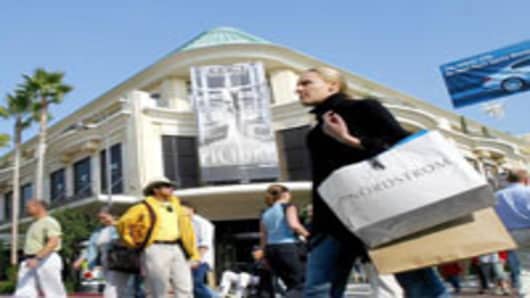The consumer is dead. Long live the consumer.
Remember all those doomsday forecasts in the past year? How the consumer was plumb tuckered out, financially drained after a decade of binge spending and credit-card run-ups?
Most experts proclaimed a permanent change in the consumer psyche of America and foresaw a pullback that would and last for years. And because consumer spending is 70% of GDP, the economy would putter along only weakly.
So how izzit that Verizon Wireless , this morning, reports signing up 2.2 million new customers in the fourth quarter, almost double the year-ago number and good for 22% revenue growth? Howizzit that Apple , the quintessential consumer brand, has just logged revenue growth of 32% on a iPhone sales that more than doubled and Mac sales that surged up 33%?
And howizzit we're looking at fourth-quarter GDP growth of perhaps 4.5% and maybe as high 6% in the view of MKM Partners’ Michael Darda? This, after Christmas sales were widely expected to fall from the depressed level of 2008, only to come in up 2% to 3%.
Most forecasters "have a pack mentality, and they tend to stay within the range of the forecasts that have already been issued," says Craig R. Johnson, president of Customer Growth Partners, one of the few firms to get Christmas right.
His outfit, in October, had forecast a 2.4% rise in holiday sales, bumping it up to 2.6% on Dec. 1. The U.S. Department of Commerce pegs the outcome at 2.3% before counting online sales as CGP does. That firm's motto, Johnson says: "You'll never make money betting against the American consumer."
There’s more: The Conference Board’s consumer confidence index, out moments ago, shows a higher-than-expected lift to 55.9 from 52.9, a “small though pleasant surprise,” notes Ian Shepherdson of High Frequency Economics. Albeit that is a far cry from the 100-plus levels that would signal a real recovery in consumer spending, he writes.
Here’s the thing, guys: If the consumer is back and feeling better than the experts realize, that could bode well for the economy and for stocks well into this year. The shopper’s mood could improve further if the jobless numbers keep declining, unlocking still more spending.
It would be alarming if this new spending is financed by credit cards at ridiculously high interest rates, but so far the numbers show that consumer savings are up and debt is heading down.
A few lessons emerge from this reanimation of the consumer who had been left for dead by so many people who should have known better:
First: In the next meltdown, don’t believe all the doomsaying forecasts. It’s never quite as bad as everyone believes. As Warren Buffet says, when everyone else is fearful, it’s time to get greedy.
Second: Real change comes far more slowly than most everyone expects, especially when it involves something as massive in scale, and as unpredictable in disposition, as consumer behavior.
And third: It may be that, in the Internet Age, events unspool more rapidly than they did in the past. So bubbles inflate faster, crashes come harder and sooner—and the rebound comes far rapidly than most folks realize.
That is, if we can manage to stay out of our own way. With the antics unfolding in Washington lately, that’s no easy “gimme.”
More Kneale ...
- The Real Deal on the Massachusetts Debacle
- The Real Numbers on Wall Street Pay
- Why I Fear an Obama-tastrophe
- Obama, Banks and the 'F' Word
- Pay Czar Cuts as Punishment
- Let's Skin Ken, We'll All Feel Better
Follow Kneale at twitter.com/denniskneale


